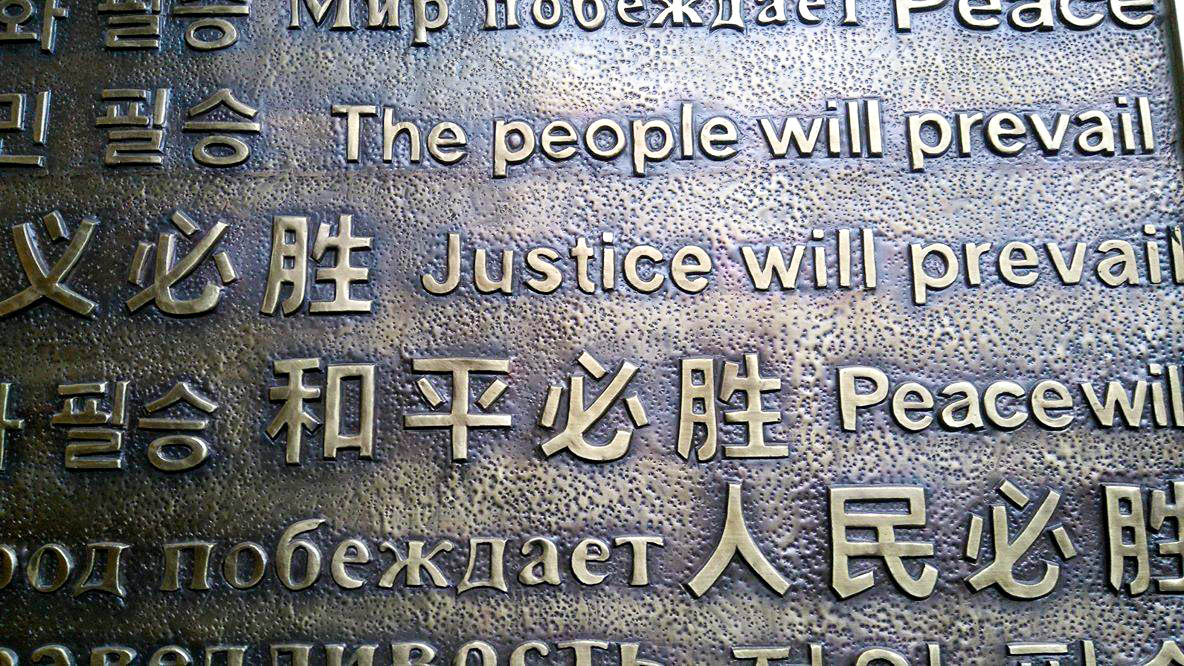Nanjing – just another Chinese city. Or is it? The place has actually boasted a huge amount of national importance over the country’s history. It was once the capital of South China (‘Nanjing’ literally means ‘South Capital’ whereas ‘Beijing’ means ‘North Capital’) and today, is one of those cities with a centre that’s developing at a crazy speed. 20 years ago, a central hotel was once the tallest in the city. Nowadays, skyscrapers twice its height tower over the hotel and everything else in the city. I was amazed at Shanghai’s modernity, but the city centre of Nanjing actually surprised me more.
The city nowadays is home to people from all over China and the rest of the world. It houses one of the country’s best universities which also hosts international students, and lots of westerners work in the city.
But, just under 80 years ago, Nanjing was the scene of tragedy. During the Japanese occupation of North-East China, when the Chinese army was weak and underfunded, troops invaded Nanjing. Some tried to flee the city, afraid of what was to come, but the government reinforced on them that ‘you must remain broken as jade rather than whole as tile’ and so many citizens of Nanjing opted to stay within the city walls.
What followed was one of the deadliest massacres of the Second World War era. From December 1937- January 1938, 300,000 men, women and children were killed in the most gruesome ways.
Some tried to flee the city as the occupation began, but then the Japanese troops surrounded the refugees and killed them all in machine gun fire. This was one of the deadliest single massacres of the event, with over 50,000 people losing their lives. It is said that the blood of these people stained the Yangtze River and the bodies laid there for months before being buried by charitable organisations. The brutal murders did not stop there; civilians and soldiers alike were slaughtered in subsequent massacres and individual murders. The enormity of the killings is unspeakably shocking and revolting.
The Chinese eventually gained the momentum to fight back and drove the Japanese forces out of the city, but not before a heartbreaking amount of tragedy. Nowadays, a huge memorial stands on the site of one of the massacres to commemorate those who lost their lives during the occupation and massacre.
As well as paying respect to those who lost their lives, the memorial reflects on the importance of visiting these sites and learning about the atrocities that have happened, so we can change the course of the future and try to prevent things like it happening again.
And this is why I would beg all travellers to China to visit Nanjing.
Heart-breaking as these events are to learn about, it is crucially important that we do learn about them. There are very few people who would fail to be moved by the distressing events that happened at Nanjing in 1937, but there are a great deal of people who don’t know about it. By comprehending the enormity of what happened, we can spread the word and campaign for the hope that this will not reoccur on such a scale in the future. The more people who visit places like this and in turn tell others about the message they behold, the greater the amount of people who are aware of the atrocities will be and the less likely it is that people will commit things like this in the future.
Perpetrator psychology is a very complex topic, something that I am by no means qualified to write about or go into in great detail, but I do strongly believe that the more awareness that there is of the details of these past atrocities, the less likely it is that similar tragedies will happen in the future.
This is why I think travellers should always take time to visit these sites around the globe. Whether it’s a concentration camp in Europe or the Khmer Rouge museum in Cambodia, I think that these sites are of such significance. It is important to pay our respects to the victims of tragedy at them and take on board the messages they behold to campaigning for a peaceful future.
What made the Nanjing memorial different for me is that the Second World War in China is almost a taboo topic, rarely talked about in Western education systems. I would beg people to visit Nanjing to pay a respect to all of the Chinese citizens who lost their lives in this cruel and devastating massacre, and to not forget the important lessons that this event beholds. To realise what a global devastation the Second World War was and how many people across the globe were effected. Coming to terms with the enormity of the crisis really helps us understand the need to work towards global peace -and I believe that this is the first step towards achieving it.
Go to Nanjing to realise that, in death and in life, we are all equal. The victims of any genocide or massacre around the globe is eternally devastating and heart-breaking and none should be overlooked. And maybe, when we start to comprehend the global scale of the devastation in World War Two and in subsequent genocides in Rwanda, Cambodia and Bosnia, as well as the current situation in some Middle Eastern countries , we definitely start to realise the importance of campaigning for peace, of encouraging others to not overlook or by-stand these events and of really pressing for a better future for the whole world.
Nanjing made me realise this.
I studied the Holocaust at university, and as I walked around the massacre memorial, many quotes by Elie Wiesel, a Holocaust survivor, echoed around my head. He spent his post-war life campaigning for the memory of Holocaust victims and the importance of learning about the event, however harrowing the education may be. He died peacefully a few months ago and for me, this was the most mournful ‘celebrity’ death of 2016.
The Nanjing memorial was, for me, a huge wake up call into what happened in this city and how much work there is to be done in the world to stop history being repeated.
This is why I would beg all travellers to China to go to Nanjing and visit the memorial. The world is progressing, but there is still so much work that needs to be done. The more people that learn about this atrocity, the more education can be spread and the less likely it is that events like this will continue to happen. And while we can educate ourselves about this type of thing through books or documentaries, it’s only really possible to feel the enormity of the catastrophe until you actually go a place dedicated to the horrific event and start to fathom what actually happened.
It’s a difficult place to visit, but what happened cannot be ignored. Please go to Nanjing massacre memorial to understand the scale of the tragedy, and to keep spreading the message about this and about other genocides all over the world, so we can combat ignorance, push for a better future, and work towards a world where this type of thing cannot exist.
People often say that a single person can’t change the world. I don’t think that’s entirely accurate; there’s lots of people who’ve done amazing things to change and create society as we know it. But one thing that we can all make a conscious effort to is learn about these atrocities and spread the word, so more and more people are informed of them. Because I truly believe that there are very few actual bad people in the world, and widespread tragedies like the Nanjing Massacre wouldn’t happen if education was more widespread. And, considering the ‘seven degrees of separation’ theory, if we all spread this message to just seven people, theoretically the world could be educated in it.
Let’s do what we can to try and prevent these unspeakable atrocities happening again. Let’s visit places like the Nanjing Massacre Memorial and use them as a source of education, for us and for the world.
Please pin and spread the word














Massacre of Nanjing is a place which can bring tears to our eyes. It has an English translation but if you only just go to look at the photographs you will be chilled to the bone. It’s a stark part of the world history and its now includes world war which makes you dive into history.
It’s so devastating isn’t it, and I find it so shocking how little people know of it.
The worst part is that Japanese government still have not apologize or even acknowledged that it ever happened. Actually them saying this is all propaganda is the worst part.